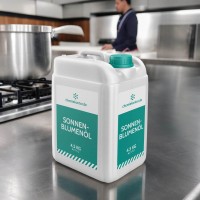Sunflower oil - what to consider:
How is sunflower oil produced?
In the past, sunflower oil was produced by cold pressing only. Today, this method of production is still used, but in the meantime sunflower oil is increasingly produced by hot pressing. In this process, the seeds of the sunflower are pressed through so-called screw presses and partially extracted and refined afterwards. This ensures a higher quality and shelf life of the oil.
What are the properties of sunflower oil?
The hue of sunflower oil obtained by cold pressing is light yellow, whereas in hot pressing it is reddish yellow. However, the refining and extraction process gives it back its light yellow and additional clear color.
Where is sunflower oil used?
Sunflower oil is used in many areas. It is best known for its use as an edible oil, for example, in salad dressings, uncooked dishes and a number of sauces. In addition, it is often the basis for mayonnaise preparations or margarine products. In this country in particular, sunflower oil is highly valued as a high-quality vegetable oil. In the pharmaceutical and medical fields, it is used in ointments, creams and in the treatment of rheumatism. In the technical field, it is often an ingredient in paints or varnishes and helps in the production of biodiesel.
What is High-Oleic Sunflower Oil?
High-oleic sunflower oil is obtained from specially cultivated plants. The special feature of this sunflower is that it has an oleic acid content of 80-90%, whereas the normal sunflower reaches a content of about 25%. Because of this, the HO sunflower is particularly well suited for technical purposes, for example in the field of lubricant production. Furthermore, it is characterized by a high heat and oxidation stability and is therefore ideally suited for frying and deep-frying. In addition, it can also be found in a number of foodstuffs as well as in high-quality cosmetic products.
All species that are cultivated today have not been genetically modified.





